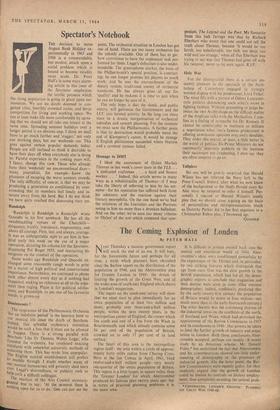Diminuendo ?
The suspension of 'the Philharmonia Orchestra for an indefinite period' is the heaviest blow to our musical life since the death of Beecham. Indeed, this splendid orchestra's extinction Would be such a loss that it must not be allowed to happen. There is a strong parallel with Beecham. Like Sir Thomas, Walter Legge, who founded the orchestra, has combined exacting standards with somewhat autocratic methods of achieving them. This has made him unpopular. The English musical establishment still prefers to muddle through. I doubt whether many of our musical bureaucrats will privately shed tears ever Leggd's discomfiture, or publicly rush to help such a difficult colleague. The reaction of the Arts Council secretary- general Was to say: 'At the moment there is nothing open for us to do.' One can just see the point. The orchestral situation in London has got out of hand. There are too many orchestras for the subsidy available. One of them has to go: how convenient to have the unpleasant task per- formed for them. Legge's defeatism is also under- standable. The gramophone market, the basis of the Philharmonia's special position, is contract- ing; he can longer promise his players so much work; and he sees the encroachment of the deputy system, traditional enemy of orchestral standards. He has always gone all out for 'quality' and he reckons it is time to quit when he can no longer be sure of it.
The only hope is that the shock, and public outcry, will ,galvanise the Government and the LCC into belated activity. In the long run there must be a drastic reorganisation of orchestral subsidies and concert planning. For the moment we must save the Philharmonia. A further point is that its destruction would probably mean the end of Klemperer's career. It would be strange if English philistinism succeeded where Nazism and a cerebral tumour failed.


































 Previous page
Previous page